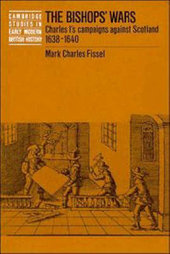
|
The Bishops' Wars: Charles I's Campaigns against Scotland, 1638-1640
Paperback / softback
Main Details
Description
King Charles I twice mobilised England in an attempt to enforce religious uniformity in Scotland, and both times he failed. The result was the resurgence of Parliament as partner in the government of the realm. The Bishops' Wars is an essay in military history in a political context, which analyses the institutions of war, its financing, and above all the recruitment of forces. The main purpose of the book is to explain why the King could not and did not reduce Scotland by force. Its significance lies in that it demonstrates how the military failures of 1639 and 1640 were determined by Charles's hand. Moreover, it seeks to show how poor strategic and tactical operations, coupled with the political controversy surrounding the war, plagued the English army. In the final measure, it is concluded that the King must bear responsibility for defeat at the hands of the Scots.
Reviews"Fissel sustains his argument with a breadth and depth of research that is truly impressive...one can hardly dismiss the author's meticulously documented case...Fissel has made an important contribution to the debate on the origins of the English Civil Wars and, more broadly, to the literature on war and the early modern state. Scholars interested in either question should read this very fine book." Journal of Modern History "...his work is of value and originality, based as it is on close research in the archives and a complete mastery of the printed sources...his main contribution lies in his very full investigation of the manner in which the armies of 1639 and 1640 were raised and of the deficiencies that rendered them unfit for battle." Austin Woolrych, Times Literary Supplement "Mark Charles Fissel has produced an immensely impressive piece of scholarship based upon a wealth of manuscript and secondary sources." Michael Young, Albion "His book serves as an excellent corrective to the new neo-Royalists...Fissel must be commended for his ability to look beyond England, not only at Ireland but more importantly at the king's enemies in Scotland. He has made good use of the relevant secondary works, and he has examined a number of documents that contain revealing material on the covenanter and Royal armies...It should receive a place on the reading lists of all courses dealing with the 'English Civil War' (more appropriately the Wars of the Three Kingdoms)." Edward M. Furgol, American Historical Review
|